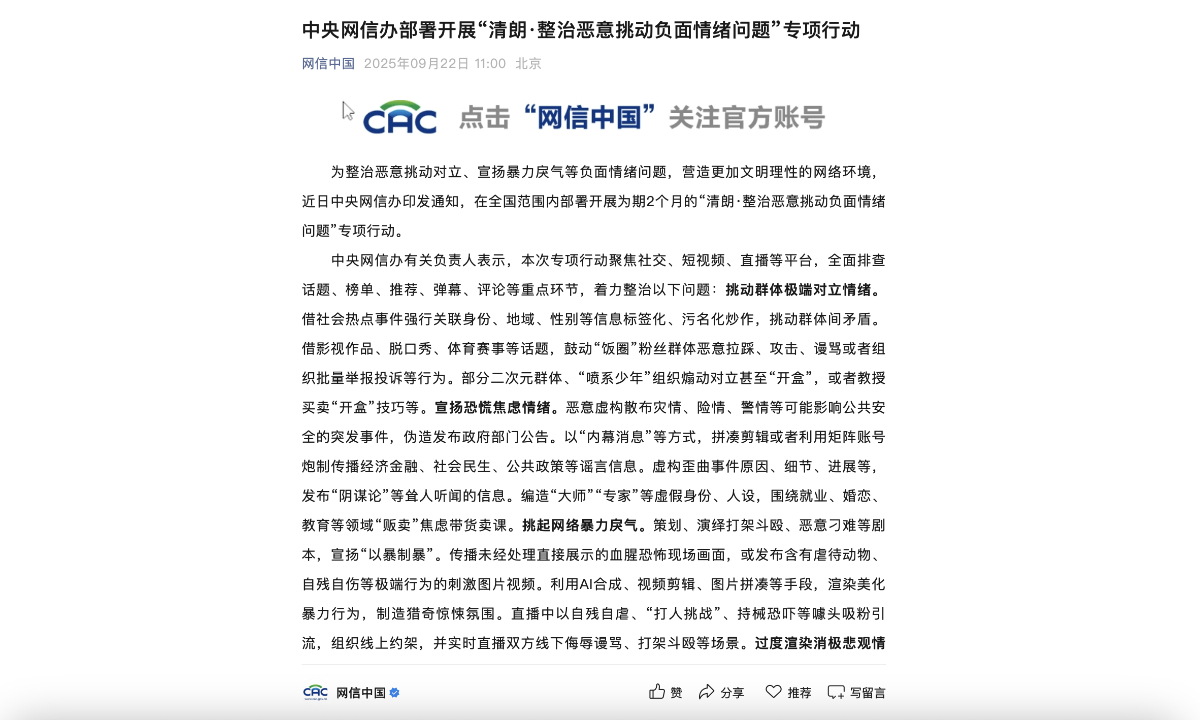 Photo: Screenshot from the official WeChat account of the Office of the Central Cyberspace Affairs Commission
Photo: Screenshot from the official WeChat account of the Office of the Central Cyberspace Affairs Commission
China's top cyberspace regulator announced on Monday a two-month nationwide campaign to address issues such as maliciously inciting confrontation and promoting violent or hostile sentiments online, with the aim of fostering a more civil and rational cyberspace environment.
The Office of the Central Cyberspace Affairs Commission said in a statement that the special campaign named Operation Qinglang will focus on social media, short-video, and livestreaming platforms, with inspections covering trending topics, rankings, recommendations, bullet screen comments, and user comments.
The authority will crack down on efforts to stir up antagonism between groups online, which include exploiting social hot topics to forcibly link identity, region, gender, and other labels for stigmatizing hype and to incite conflicts between groups.
Meanwhile, the campaign also targets the misuse of discussions about films and TV shows, stand-up comedy, sports events, and similar subjects to encourage fandom to maliciously disparage, attack, insult, or organize mass complaints.
Besides, the authority will regulate some cosplay groups and the groups of teenagers involved in online violence organizations who incite confrontation or engage in doxxing, or even teach and trade doxxing techniques.
The cyberspace administration will also crack down on activities that spread fear and anxiety. These include maliciously fabricating and spreading false information about disasters, accidents, public security incidents, or other emergencies that could affect public safety, as well as forging and releasing fake government announcements; concocting and editing content or using networks of linked accounts to fabricate and disseminate rumors about the economy and finance, social livelihood issues, or public policies under the guise of "insider information"; inventing or distorting the causes, details, or developments of events to publish sensational "conspiracy theories"; and creating fake identities or personas as "masters" or "experts" to peddle anxiety and sell products or courses related to jobs, relationships, education, and other issues.
The campaign will also target actions that incite online violence and hostility. Such behaviors include sharing raw, unedited images or footage of bloody and terrifying scenes, posting graphic pictures and videos depicting extreme acts such as animal abuse or self-harm, as well as using AI-generated content, video editing, or image splicing to sensationalize or glamorize violent acts and create a shocking or macabre atmosphere.
The campaign will also address the excessive amplification of negative and pessimistic sentiments online. This includes promoting absolutist views such as "hard work is useless" or "education is useless"; misinterpreting social phenomena, exaggerating isolated negative cases, or using them to spread nihilistic or world-weary outlooks on life.
Online behaviors that create trending keywords, memes, emojis, or quotes to excessively belittle oneself or amplify feelings of gloom and negativity, thereby encouraging imitation and copycat behavior will also be regulated by the authority.
An official from the cyberspace authority emphasized that local cyberspace authorities must strictly follow the campaign's requirements, strengthen inspections and enforcement, and impose strict measures and penalties on websites, platforms, accounts, and multi-channel network (MCN) organizations that made serious violations.
Platforms are urged to take corrective actions and conduct thorough self-inspections to close loopholes and ensure a healthy online environment. Meanwhile, online users and all sectors of society are encouraged to actively report violations and work together to resist malicious incitement of negative sentiments, the statement said.






